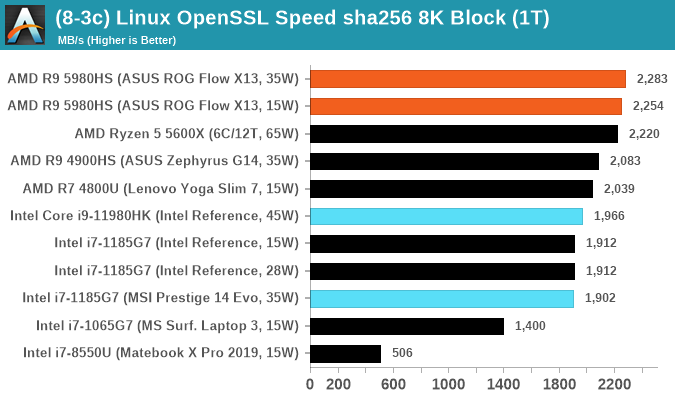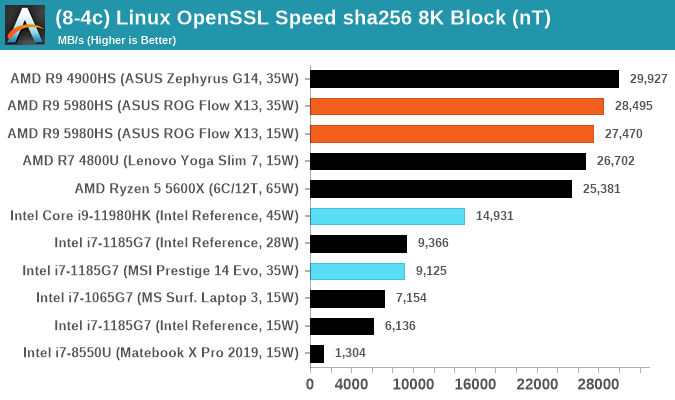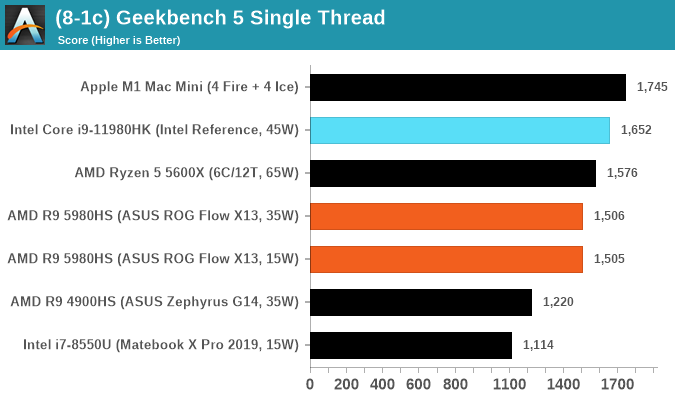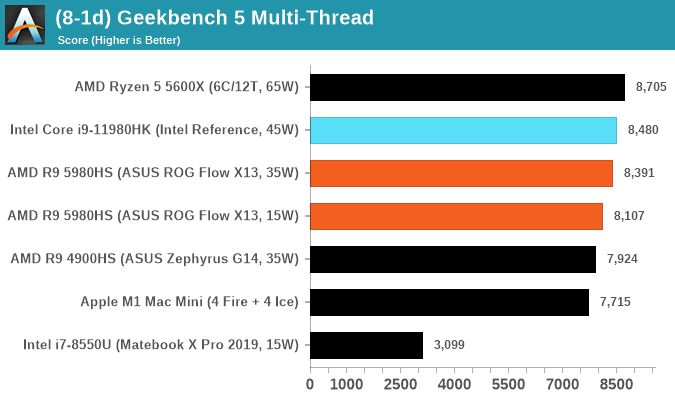Intel 11th Generation Core Tiger Lake-H Performance Review: Fast and Power Hungry
by Brett Howse & Andrei Frumusanu on May 17, 2021 9:00 AM EST- Posted in
- CPUs
- Intel
- 10nm
- Willow Cove
- SuperFin
- 11th Gen
- Tiger Lake-H
CPU Tests: Synthetic
Most of the people in our industry have a love/hate relationship when it comes to synthetic tests. On the one hand, they’re often good for quick summaries of performance and are easy to use, but most of the time the tests aren’t related to any real software. Synthetic tests are often very good at burrowing down to a specific set of instructions and maximizing the performance out of those. Due to requests from a number of our readers, we have the following synthetic tests.
Linux OpenSSL Speed: SHA256
One of our readers reached out in early 2020 and stated that he was interested in looking at OpenSSL hashing rates in Linux. Luckily OpenSSL in Linux has a function called ‘speed’ that allows the user to determine how fast the system is for any given hashing algorithm, as well as signing and verifying messages.
OpenSSL offers a lot of algorithms to choose from, and based on a quick Twitter poll, we narrowed it down to the following:
- rsa2048 sign and rsa2048 verify
- sha256 at 8K block size
- md5 at 8K block size
For each of these tests, we run them in single thread and multithreaded mode. All the graphs are in our benchmark database, Bench, and we use the sha256 results in published reviews.


GeekBench 5: Link
As a common tool for cross-platform testing between mobile, PC, and Mac, GeekBench is an ultimate exercise in synthetic testing across a range of algorithms looking for peak throughput. Tests include encryption, compression, fast Fourier transform, memory operations, n-body physics, matrix operations, histogram manipulation, and HTML parsing.
Unfortunately we are not going to include the Intel GB5 results in this review, although you can find them inside our benchmark database. The reason behind this is down to AVX512 acceleration of GB5's AES test - this causes a substantial performance difference in single threaded workloads that thus sub-test completely skews any of Intel's results to the point of literal absurdity. AES is not that important of a real-world workload, so the fact that it obscures the rest of GB5's subtests makes overall score comparisons to Intel CPUs with AVX512 installed irrelevant to draw any conclusions. This is also important for future comparisons of Intel CPUs, such as Rocket Lake, which will have AVX512 installed. Users should ask to see the sub-test scores, or a version of GB5 where the AES test is removed.


To clarify the point on AES. The Core i9-10900K scores 1878 in the AES test, while 1185G7 scores 4149. While we're not necessarily against the use of accelerators especially given that the future is going to be based on how many and how efficient these accelerators work (we can argue whether AVX-512 is efficient compared to dedicated silicon), the issue stems from a combi-test like GeekBench in which it condenses several different (around 20) tests into a single number from which conclusions are meant to be drawn. If one test gets accelerated enough to skew the end result, then rather than being a representation of a set of tests, that one single test becomes the conclusion at the behest of the others, and it's at that point the test should be removed and put on its own. GeekBench 4 had memory tests that were removed for Geekbench 5 for similar reasons, and should there be a sixth GeekBench iteraction, our recommendation is that the cryptography is removed for similar reasons. There are 100s of cryptography algorithms to optimize for, but in the event where a popular tests focuses on a single algorithm, that then becomes an optimization target and becomes meaningless when the broader ecosystem overwhelmingly uses other cryptography algorithms.










229 Comments
View All Comments
Alistair - Monday, May 17, 2021 - link
no, that's not right, Tiger Lake is mainly clock speed improvements, not IPC, running Tiger Lake or Comet Lake in a desktop at the same 4.8GHZ all core would get you almost exactly the same performanceheickelrrx - Monday, May 17, 2021 - link
are u drunk?laduran - Tuesday, May 18, 2021 - link
Nomode_13h - Tuesday, May 18, 2021 - link
> Tiger Lake is mainly clock speed improvements, not IPC, running Tiger Lake or Comet Lake> in a desktop at the same 4.8GHZ all core would get you almost exactly the same performance
You're confusing Comet Lake with Ice Lake. IPC of Tiger Lake isn't much improved above that of Ice Lake.
Qasar - Wednesday, May 19, 2021 - link
can you blame him ? its time intel started using different names for their cpus.mode_13h - Thursday, May 20, 2021 - link
I didn't mean that in a pointed way. If anything, I thought it would partially validate the statement.And yes, I wish Intel would've left the Lakes behind with 14 nm, but I guess there are just too many "lake" names for them to part with it for the mere sake of naming consistency. More annoyingly, they're even using "lake" names for some things that aren't CPUs.
Qasar - Thursday, May 20, 2021 - link
it seems they are staying with lake and cove names so unless you are using a slide ruler and a decoder ring, you have no idea which cpu is what :-) i gave up trying to keep track of their names are which cpu line a while ago.mode_13h - Friday, May 21, 2021 - link
> it seems they are staying with lake and cove namesSapphire Rapids is the next server CPU. Also, the little cores seem to be Monts, while the big cores are Coves.
I think the biggest groaner is "Lakefield", which is that mobile CPU with one big core, 4 little cores, and a chunk of eDRAM. MS used it in a Surface model.
Qasar - Friday, May 21, 2021 - link
mode_13h, still doesnt change the fact that the names intel gives its cpus, are confusing has he double hockey sticks :-)mode_13h - Sunday, May 23, 2021 - link
Oh, for sure. It was so nice when *Bridge = LGA 1155, *Well = LGA 1150, and *Lake = LGA 1151....then, it seemed like nearly everything became a Lake!